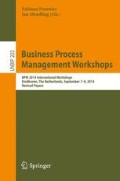Abstract
Process mining is a field traditionally concerned with retrospective analysis of event logs, yet interest in applying it online to running process instances is increasing. In this paper, we design a predictive modeling technique that can be used to quantify probabilities of how a running process instance will behave based on the events that have been observed so far. To this end, we study the field of grammatical inference and identify suitable probabilistic modeling techniques for event log data. After tailoring one of these techniques to the domain of business process management, we derive a learning algorithm. By combining our predictive model with an established process discovery technique, we are able to visualize the significant parts of predictive models in form of Petri nets. A preliminary evaluation demonstrates the effectiveness of our approach.
Access this chapter
Tax calculation will be finalised at checkout
Purchases are for personal use only
Notes
References
van der Aalst, W.M.P.: Process Mining: Discovery, Conformance and Enhancement of Business Processes. Springer, Heidelberg (2011)
van der Aalst, W.M.P.: Process discovery: capturing the invisible. IEEE Comput. Intell. Mag. 5(1), 28–41 (2010)
van der Aalst, W.M.P., Pesic, M., Song, M.: Beyond process mining: from the past to present and future. In: Pernici, B. (ed.) CAiSE 2010. LNCS, vol. 6051, pp. 38–52. Springer, Heidelberg (2010)
van der Aalst, W.M.P., Schonenberg, M.H., Song, M.: Time prediction based on process mining. Inf. Syst. J. 36(2), 450–475 (2011)
Kim, A., Obregon, J., Jung, J.-Y.: Constructing Decision Trees from Process Logs for Performer Recommendation. In: Lohmann, N., Song, M., Wohed, P. (eds.) BPM 2013 Workshops. LNBIP, vol. 171, pp. 224–236. Springer, Heidelberg (2014)
de la Higuera, C.: A bibliographical study of grammatical inference. Pattern Recogn. 38, 1332–1348 (2005)
Verwer, S., Eyraud, R., de la Higuera, C.: PAutomaC: a PFA/HMM learning competition. Mach. Learn. J. (2013)
Shmuelli, G., Koppius, O.R.: Predictive analytics in information systems research. Manag. Inf. Syst. Q. 35(3), 553–572 (2011)
van der Aalst, W.M.P., Rubin, V., Verbeek, H.M.W., van Dongen, B.F., Kindler, E., Günther, C.W.: Process mining: a two-step approach to balance between underfitting and overfitting. Softw. Syst. Model. 9(1), 87–111 (2010)
de la Higuera, C.: Grammatical Inference. Cambride University Press, Cambridge (2010)
van der Aalst, W.M.P.: The application of petri nets to workflow management. J. Circuits Syst. Comput. 8(1), 21–66 (1998)
Koller, D., Friedman, N.: Probabilistic Graphical Models: Principles and Techniques. The MIT Press, Cambridge (2009)
Rabiner, L.R.: A tutorial on hidden markov models and selected applications in speech recognition. Proc. IEEE 77(2), 257–286 (1989)
Vidal, E., Thollard, F., de la Higuera, C., Casacuberta, F., Carrasco, R.C.: Probabilistic finite-state machines - part I. IEEE Trans. Pattern Anal. Mach. Intell. 27(7), 1013–1025 (2005)
Verwer, S., Eyraud, R., de la Higuera, C.: Results of the PAutomaC probabilistic automaton learning competition. In: 11th International Conference on Grammatical Inference, pp. 243–248 (2012)
Shibata, C., Yoshinaka, R.: Marginalizing out transition probabilities for several subclasses of Pfas. In: JMLR - Workshop Conference Proceedings, ICGI 2012, vol. 21, pp. 259–263 (2012)
Hulden, M.: Treba: efficient numerically stable EM for PFA. In: JMLR Workshop Conference Proceedings, vol. 21, pp. 249–253 (2012)
Hastie, T., Tibshirani, R., Friedman, J.: The Elements of Statistical Learning - Data Mining, Inference, and Prediction, 2nd edn. Springer, New York (2009)
van der Aalst, W.M.P., et al.: Process mining manifesto. In: Daniel, F., Barkaoui, K., Dustdar, S. (eds.) BPM Workshops 2011, Part I. LNBIP, vol. 99, pp. 169–194. Springer, Heidelberg (2012)
Steck, H., Jaakkola, T.: On the dirichlet prior and bayesian regularization. Neural Inf. Process. Syst. 15, 1441–1448 (2002)
Barber, D.: Bayesian Reasoning and Machine Learning. Cambridge University Press, Cambridge (2011)
Bishop, C.M.: A new framework for machine learning. In: Zurada, J.M., Yen, G.G., Wang, J. (eds.) WCCI 2008, Plenary/Invited Lectures. LNCS, vol. 5050, pp. 1–24. Springer, Heidelberg (2008)
Dempster, A., Laird, N., Rubin, D.: Maximum likelihood from incomplete data via the EM algorithm. J. R. Stat. Soc. Ser. B 39(1), 1–22 (1977)
Bishop, C.M.: Pattern Recognition and Machine Learning. Springer, New York (2006)
Moon, T.K.: The expectation-maximization algorithm. IEEE Signal Process. Mag. 13(6), 47–60 (1996)
Murphy, K.: Machine Learning: A Probabilistic Perspective. The MIT Press, Cambridge (2012)
Akaike, H.: Information theory and an extension of the maximum likelihood principle. In: Second International Symposium on Information Theory, pp. 267–281 (1973)
Cortadella, J., Kishinevsky, M., Kondratyev, A., Lavagno, L., Yakovlev, A.: Petrify: a tool for manipulating concurrent specifications and synthesis of asynchronous controllers. IEICE Trans. Inf. Syst. E80-D(3), 315–325 (1997)
van Dongen, B.F.: BPI Challenge 2012 (2012). http://www.win.tue.nl/bpi/2012/challenge
Adriansyah, A., Buijs, J.: Mining Process Performance from Event Logs: The BPI Challenge 2012 Case Study. BPM Center Report BPM-12-15 (2012). BPMcenter.org
Author information
Authors and Affiliations
Corresponding author
Editor information
Editors and Affiliations
Rights and permissions
Copyright information
© 2015 Springer International Publishing Switzerland
About this paper
Cite this paper
Breuker, D., Delfmann, P., Matzner, M., Becker, J. (2015). Designing and Evaluating an Interpretable Predictive Modeling Technique for Business Processes. In: Fournier, F., Mendling, J. (eds) Business Process Management Workshops. BPM 2014. Lecture Notes in Business Information Processing, vol 202. Springer, Cham. https://doi.org/10.1007/978-3-319-15895-2_46
Download citation
DOI: https://doi.org/10.1007/978-3-319-15895-2_46
Published:
Publisher Name: Springer, Cham
Print ISBN: 978-3-319-15894-5
Online ISBN: 978-3-319-15895-2
eBook Packages: Computer ScienceComputer Science (R0)

